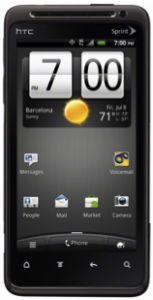 While already committed to upgrading the HTC EVO Design 4G to Android 4.0, Ice Cream Sandwich, HTC and Sprint today shipped an interim firmware update for the device.
While already committed to upgrading the HTC EVO Design 4G to Android 4.0, Ice Cream Sandwich, HTC and Sprint today shipped an interim firmware update for the device.
The update, version 2.12.651.8 is the second update for the device released this year, and only notes “security updates” as the single change. It is not clear if this is related to HTC Wi-Fi Security Flaw, or if there were other security holes fixed.
HTC earlier this year confirmed a security hole in their Wi-Fi protocol, that affected a wide range of their devices. HTC committed to updating all affected devices. The company posted a Wi-Fi Security Fix web site, allowing older devices to download the update manually after entering their serial numbers. HTC had noted the EVO Design 4G had been updated for this issue, drawing into question if the EVO Design 4G had other outstanding potential security flaws.
PhoneNews.com has contacted HTC requested a list of the security updates, and will follow-up if we hear back.
The EVO Design 4G (alongside the similar EVO 3D) is HTC’s flagship smartphone on Sprint today. It launched in-between the EVO 4G and EVO 4G LTE, and was meant to compliment the EVO Shift 4G, which served as a low-end alternative to the original EVO. The EVO Design 4G trades EVO 3D’s three-dimensional camera array and screen for international GSM/UMTS/HSPA roaming capability, with a factory unlocked SIM slot.
HTC will replace both the EVO 4G and EVO Design 4G with the EVO 4G LTE, set to launch later this quarter.
HTC has stated that the EVO Design 4G will receive Android 4.0 later this year, but has not provided a more specific timeframe. HTC and Motorola have faced setbacks in upgrading their Android 2.3-era smartphones to Android 4.0, as Google chose to partner with Samsung in building Ice Cream Sandwich (ICS) for its Galaxy S II-based Galaxy Nexus superphone. The move gave Samsung engineers significant lead time in engineering ICS for their smartphones and tablets.
Google routinely toggles handset favorites in emerging Android. HTC was the original device partner that launched Android 1.0, Motorola collaborated with Google to launch Android 2.0, and Android 3.0 for tablets. Rumors persist that ASUS and Huawei will likely be tapped by Google for engineering the first in a line of next-generation, lower-cost Android 4.0 and 5.0 tablet devices.
EVO Design 4G owners can update their devices over-the-air, via the HTC Software Update function inside Settings.